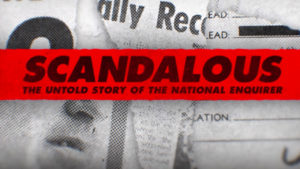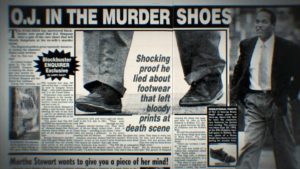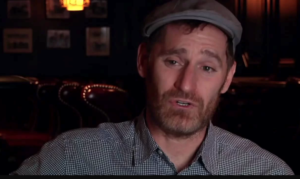 When Generoso Pope, Jr. purchased the newspaper The New York Enquirer in 1952, ostensibly with an interest-free $75,000 loan from mob boss Frank Costello, events were set in motion for the evolution of a world-renowned tabloid, known since 1954 as The National Enquirer.
When Generoso Pope, Jr. purchased the newspaper The New York Enquirer in 1952, ostensibly with an interest-free $75,000 loan from mob boss Frank Costello, events were set in motion for the evolution of a world-renowned tabloid, known since 1954 as The National Enquirer.
Enter director Mark Landsman, who claimed that “the story found me,” in creating a whirlwind examination of The Enquirer for CNN. “I was out to dinner with friends and their father in 2016,” he said of a Los Angeles meeting. “He was talking about his job as a reporter on the ground level of The National Enquirer. He regaled us with stories about questionable tactics and ethically challenging journalism. I knew there was a film there.”
In Los Angeles, Landsman approached a financier who was willing to fund a trailer and proposal which was accepted by CNN Films, with the participation of Magnolia Pictures. Diving into research, Landsman found a heroic figure in Pope, Jr. “People needed to know who he was,” Landsman reflected of his initial endeavors on the project, eventually titled Scandalous: The Untold Story of the National Enquirer, with Pope, Jr. at the forefront of the film. “He was influential in business and politics. He’s a real Horatio Alger—this epic American character. Son of an immigrant who wants to make his mark.”

Indeed, Pope, Jr.’s father, Generoso Pope was a newspaperman himself, having been born in Italy, and, after immigrating to the United States, became owner of Il Progresso, the largest Italian-American weekly. After Pope passed in 1950, Pope, Jr. quickly looked to fill his father’s shoes. From 1952 until his own death in 1988, Pope, Jr. shaped definitive aspects of the American landscape. “He couldn’t have predicted the supermarket tabloid’s influence on the culture,” Landsman said of Pope, Jr.’s efforts with The National Enquirer. “It was written off as a trashy rag. Nothing could be further from the truth. It was a mirror where we were at as a country—you can see what Middle America was obsessed with.”
As Landsman wound his way around the avenues of The Enquirer’s past, some doors opened for him while other critical figures were suspicious of the angle Landsman wanted to take on the material. At Landsman’s behest, Scandalous covered much of the pivotal early history of the paper, including when Pope, Jr. moved The Enquirer to Florida in 1971, leading to its heyday. “Pope was like William Randolph Hearst,” Landsman remarked. “He was like Citizen Kane—larger than life; a character from another era. He was always, genuinely all about the story. He had a passion for making the mind of Mr. Smith in Kansas City tick.”

In addition to interviews with many Enquirer staffers and reporters, Scandalous features a remarkable assemblage of archival photos and footage from the paper’s Florida headquarters. “Making documentaries is an intensive collaborative effort,” Landsman unveiled, crediting archival producer Aileen Silverstone. “It’s a no-stone-unturned process, needle in a haystack, when looking for archival. On top of it, you have to lean heavily into fair use to be protected in the process. It’s incumbent upon documentarians to get familiar with fair use—it allows documentarians to tell a fuller story.”
In certain instances, Landsman came across wholly unexpected pieces of information. “I was gobsmacked when an editor at the Enquirer handed me a folder stamped Story Control,” Landsman detailed, citing the paper’s ability to kill stories in which stunning revelations had been made about public figures, while other stories remained an authentic Enquirer scoop. “That’s a remarkable feeling as a filmmaker. History comes alive in those moments. You don’t have to tell a film with a bunch of clips that are a rehash. You have the tangible articles themselves that makes the story visceral. It’s a treasure hunt.”
Given that Landsman had access to an ‘embarrassment of riches,’ many sections in Scandalous are a riveting look at a paper whose employees took their work as seriously as imaginable. “They wanted the legacy to be understood,” Landsman said of key Enquirer personnel. “Most of them, if not all of them, took great pride in the work that they did. They didn’t give a whole lot of thought to the ethical choices that they were making. How can I tell a fair film without hanging them out to dry? Our job is to let people roll their own gallows out if they want—let the audience decide.”

Without hesitation, Landsman pointed to the massive funds available to The National Enquirer being key to their pursuits of high profile sensationalism with which to grace their headlines, a phenomenon which likely increased when the company was purchased by in 1989 by American Media Inc. “It was really eye-opening to look at what they did,” described Landsman, specifying the O.J. Simpson tragedy and trial which began in 1994. In that instance, Scandalous explores how key Enquirer operatives discovered singular elements of the story prior to any other media outlets. “That was an example of putting every single dollar that they had behind something, and using the power of the purse to see what they came up with. In their own bizarre way, they were investigative with a whole different level of tactics. This willingness to shell out any sum of money to pay anyone with anything, often without corroboration.”
Notably, under American Media, Inc., David Pecker ran The Enquirer in a decidedly different manner than his predecessor. “Pecker is a businessman; he’s not a journalist,” Landsman claimed. “He just came in and did not have a regard for what built the Enquirer and made it what it was. From the people who worked there, it was a dramatic change across the board. That’s the most interesting moment in the film—how quickly things can change when leadership changes.”

After shooting Scandalous’ footage over three months, followed by six-and-a-half months of post-production, Landsman took the film to festivals before its airing on CNN. Now, the project is available on a variety of platforms (please see the postscript), and Landsman professed satisfaction with the accomplishment. “Documentary filmmaking is a tsunami,” he conveyed. “Get caught up in something, and it sweeps you. We wanted to capture a romp, craziness, madcap, Oceans 11 of it. It was a crazy exhaustive sprint.”
With Scandalous now in release, Landsman has already been developing two new documentary projects and will launch one when he feels it is properly prepared. “Having a great idea and access is half the battle,” he said. “You have to get people excited about the idea. It’s hard to get films made—you have to jump through a lot of hoops.”
For more information and to view Scandalous, please link to: https://www.scandalousfilm.com/.





